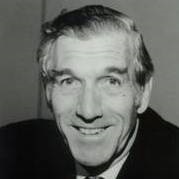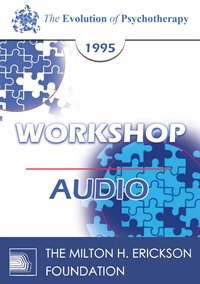EP95 Workshop 10 - To Teach a Different "Game," or: "Prescribing" Instead of Interpreting - Paul Watzlawick, PhD
- Average Rating:
- Not yet rated
- Topic Areas:
- Workshops | Psychotherapy | Therapist Development | Systems Theory | Intervention Strategies
- Categories:
- Evolution of Psychotherapy | Evolution of Psychotherapy 1995 | Pioneers in Couples and Family Therapy
- Faculty:
- Paul Watzlawick, PhD
- Duration:
- 2 Hours 36 Minutes
- Format:
- Audio Only
- Original Program Date:
- Dec 13, 1995
- License:
- Never Expires.
Tags: Paradoxical Interventions Strategic Use of Language Symptom Prescription Therapist Flexibility Utilization Rapid Intervention Adolescents Behavioral Prescriptions Ericksonian Hypnosis and Therapy Techniques Gregory Bateson Perfectionism Resistance Sex and Sexuality Suggestion Therapeutic Relationship
Description
Description: This workshop explores how rigid, self-reinforcing behavioral patterns—“games without end”—can be disrupted through meta-level interventions. Drawing on Bateson’s systems theory and Erickson’s clinical methods, the discussion covers strategies like benevolent sabotage, paradox, and behavior prescriptions that shift entrenched dynamics. Practical examples include work with perfectionism, sexual disconnection, and resistant teens. The role of language, suggestion, and therapeutic relationship are central themes throughout.
Syllabus Description: Human problems can be seen as "games without end; " that is, as recurring behaviors based on the continuous application of rigid rules, but devoid of rules for the change of these rules. What are such "meta-rules" and how can they be introduced?
Educational Objectives:
- To sketch briefly the fundamental contributions of Ludwig Wittgenstein, Gregory Bateson and Milton H. Erickson to this subject.
- To present specific interventions (behavior prescriptions, therapeutic double-binds, positive connotations, reframing, and the "illusion of alternatives," etc.,) by means of case descriptions, taped examples and role plays.
*Sessions may be edited for content and to preserve confidentiality*
Credits
Handouts
| Timestamped Transcript (1.4 MB) | 36 Pages | Available after Purchase |
| Ericksonian Learning Snapshot (256.3 KB) | 2 Pages | Available after Purchase |
Faculty

Paul Watzlawick, PhD Related Seminars and Products
Paul Watzlawick, received his Ph.D. from the University of Venice in 1949. He has an Analyst's Diploma from the C.G. Jung Institute for Analytic Psychology in Zurich. Watzlawick has practiced psychotherapy for more than 30 years. He was research associate and principal investigator at the Mental Research Institute. He was Clinical Professor at the Department of Psychiatry and Behavioral Sciences, Stanford University Medical Center. Watzlawick is a noted family therapist; he is recipient of the Distinguished Achievement Award from the American Family Therapy Association. Also, he is author, co-author or editor of eight books on the topics of interactional psychotherapy, human communication and constructivist philosophy.
He formulated five axioms. They are:
- It is not possible to not communicate. Every behavior is some kind of non-verbal communication.
- Every communication has a content. In addition, there is 'metainformation', which says how the communicator wants to be understood.
- All partners involved in a communication process also interpret their own behaviour during communication.
- Human communication involves both verbal and non-verbal communication. In addition to the spoken words, there are is also a non-spoken part (gestures, behavior, intonation..) which is part of the communication.
- Communication between humans is either symmetric or complementary. This is based on whether the relationship of those communicating is based on differences or parity.


